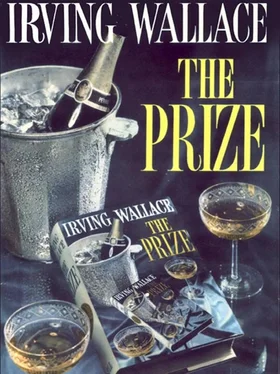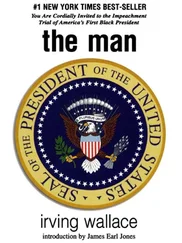Gisèle lay petrified, gazing with bewilderment at Claude’s face above her. The telephone was waiting. She tried to find her voice again. ‘But-there is no one here-’
‘Put him on. This is important!’ It was a command.
Gisèle was dumbfounded, helpless. Her poise was gone. She covered the mouthpiece fully, and looked imploringly at Claude. ‘Your wife-she knows-’
‘No, I cannot. Say anything,’ he begged.
Gisèle would not return to the telephone. ‘She says it’s important-’
The length of their exchange had given them away, and Claude knew it. Miserably, he disengaged his body from Gisèle’s, took the prosecuting telephone, and sat up, cross-legged, on the bed.
‘Denise? Listen to me-’
‘You listen, you rotten pig-you pull your trousers on and come home. The press is on its way-we’ve just won the Nobel Prize!’
It was 5.07 in the afternoon when the telegram from the Swedish Embassy in Washington, D.C., clattered through the electric machine of the telegraph office located on West Peachtree Street in Atlanta, Georgia.
The mousy-haired girl, with thyroid eyes, on the machine at the time, pulled the message out with a rebel yell. ‘Lookit who won the Nobel Prize!’ she shouted. The other two girls came out of their chairs running, and the jubilation even attracted the three delivery boys, who had been shooting dice in the rear.
Eventually, the exclamations and buzz of excitement brought Mr. Yancey, the manager, out of his cosy cubicle. He had been reading the Atlanta Constitution and drinking a coke, beside the heater, his favourite occupation on a dirty-grey, rainy afternoon such as this.
He appeared buttoning his trouser top and buckling his belt around his flabby middle, and calling out, ‘What’s up? What’s up? What’s going on here?’
One of the girls passed the strip of tape to Mr. Yancey, and he read it, and grinned broadly. ‘Say now, say now, this is a big day for the capital of the South.’ Although the victor had been born more than three thousand miles from Atlanta, and had only made his home here the last three years, the hero-starved half a million Atlantans considered the great man their own, by adoption. ‘Biggest thing since old J. S. Pemberton concocted Coca-Cola,’ said Mr. Yancey. ‘Biggest thing since Margaret Mitchell.’
‘Lemme deliver it,’ one of the young boys piped up.
‘Not on your life, son, not on your life,’ said Mr. Yancey. ‘This is a solemn occasion. This is somethin’ Mr. Yancey does personally.’
‘Bet you just want to have yourself another look at that Miss Emily,’ said the mousy-haired girl, daringly.
‘Take care, sister,’ said Mr. Yancey. ‘This here message is too important. You get it ready now.’
He waved the strip of tape. ‘Man, oh man,’ he said, and then, before releasing the message, he read it once more.
IN RECOGNITION OF YOUR DISCOVERY AND INVENTION OF A PHOTOCHEMICAL CONVERSION AND STORAGE SYSTEM FOR SOLAR ENERGY AND OF YOUR PRACTICAL APPLICATION OF SOLAR ENERGY TO PRODUCE SYNTHESIZED SOLID ROCKET PROPELLANTS THE NOBEL FOUNDATION OF STOCKHOLM ON BEHALF OF THE ROYAL SWEDISH ACADEMY OF SCIENCE IS PLEASED TO INFORM YOU THAT YOU HAVE TODAY BEEN VOTED THIS YEARS NOBEL PRIZE IN PHYSICS STOP THE PRIZE WILL BE A GOLD MEDALLION AND A CHEQUE FOR FIFTY THOUSAND THREE HUNDRED DOLLARS STOP THE AWARD CEREMONY WILL TAKE PLACE IN STOCKHOLM ON DECEMBER TENTH STOP DETAILS FOLLOW STOP HEARTIEST CONGRATULATIONS STOP
The message was addressed to DOCTOR MAX STRATMAN ONE THOUSAND FORTY FOUR PONCE DE LEON AVENUE ATLANTA GEORGIA…
For Max Stratman, at the age of sixty-two, it was always a pleasure, which few people would understand, to lie on the hard table in the darkened room beside the elaborate electrocardiograph equipment, while an efficient, antiseptic nurse dabbed the paste on his chest, arms, and legs, and then applied the electrodes with their five lead wires-one to his chest, two to his arms, and two to his legs. This experience, in which he engaged twice a year at the behest of the United States government, was soothing, relaxing, and always conductive to clear thinking.
This afternoon, however, as Max Stratman stretched on the table, chest, arms, legs bared, half watching the tall bespectacled, comely nurse attach the cool electrodes to his skin, his pleasure, for the first time in memory, was shadowed faintly by apprehension. He reasoned that the apprehension had entered into the EKG test because today the test was especially important.
In the three years past, since he had accepted the government’s offer to join the high-level staff of the Society for Basic Research outside Atlanta, he had attended these checkups, one in January and one in July, as a matter of routine. But now it was only mid-November and the next checkup was not due for two more months, yet here he was supine on the table, teeming with electrodes and wires, not as a matter of routine but as a volunteer.
Max Stratman was as pragmatical as the Teutonic forebears on his father’s side of the family. He rarely rationalized any position, but met it head on. He knew exactly why he had telephoned Dr. Fred Ilman yesterday, at Lawson General Hospital, a mile from the Society building, and had requested an immediate appointment. In the first place, there was the surprising and exhilarating offer from Washington, D.C. The offer was critical to Stratman because, projected over the next two years, it might fully solve a personal problem, a certain responsibility, that had been weighing heavily upon him. Yet he had been made to realize that accepting the offer would mean changing his way of life, would put more strain on an old, ill-used, and often reluctant physique. Still, the change was something to be desired, a godsent gift, because it would alleviate his one major worry. The question he had asked himself, after the Defence Department call, was this: could he dare to undertake the change?
There would have been no question at all, had he not recalled the results of his last cardiogram in the summer. At that time, Dr. Ilman had cheerfully informed him, displaying the strip of graph paper that bore the curve of his heartbeat, that a minor irregularity was in evidence. But it was minor, Dr. Ilman emphasized, of no importance, provided that Stratman did not drastically change his habits. If Stratman continued to live like a sloth, without peaks or valleys of excitement, without excessive activities or long hours or pressure, he might continue his doubtful way of life-his erratic diet, daily beer, meerschaum pipe, lack of exercise-and possibly live forever.
‘After all, you’re not a youngster any more, Max,’ Fred Ilman had said on that occasion. ‘If you were a much younger man, and you came up with this minor irregularity, I would suggest a special regime against the future-oh, you know, lighter diet and low fat, no drinking, cut down on smoking, moderate exercises. But you are sixty-two, and to suggest any drastic changes, to rock the boat, could be worse then letting you sail along, at moderate speed, as you are now doing. So go back to your drawing-board and your quantum nonsense and your solar sleight-of-hand, and don’t bother me until next January. Just stay as sweet as you are, and my regards to Emily.’
But now, there was suddenly an urgent necessity to rock the boat, and Max Stratman was having a cardiograph test in November, not January, because the decision must be made by the weekend.
The nurse had finished applying the electrode to the first paste spot on his chest, and now she turned back to the EKG machine. ‘All right, Professor Stratman,’ she said, ‘we’ll begin. It’ll only be a few minutes.’
The machine behind his head began to whir. The strip of graph paper, recording the superficial biography of his physical heart, began to emerge with its coded story. Head turned on the pillow, Stratman watched it a moment, unaccountably pleased that the nurse had referred to him as ‘Professor’, in the old-fashioned European manner, rather than as ‘Doctor’, in the less dignified American style. Herr Professor, it had always been, until 1945, when Walther had got him to the Americans, just before the Russian authorities came calling. Still, he had not minded the informality of the Americans, because they compensated for social failings by their genuine friendliness, their appreciation of his small genius, and, above all, because they brought him to a wondrous climate of freedom. Not once, it seemed, since he had been spirited out of Germany, had he glanced back over his shoulder to see who might be listening.
Читать дальше












